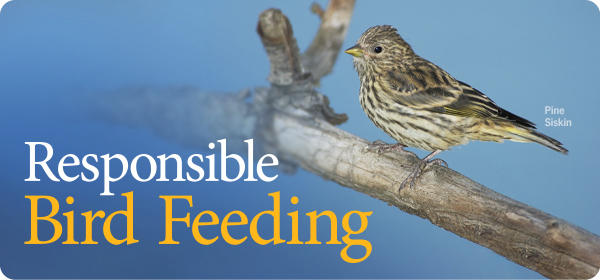IMPORTANT! Please read.
It has come to our attention that a Salmonellosis outbreak that began in Washington State has made it's way to our local area. Customers have reported sick and dead Goldfinches in their yards. We, at Wild Birds Unlimited, Carlsbad, take the health of our bird population very seriously, and we ask that you read the below information and act quickly to help Save the Songbirds.
Pine siskins, a species of finch that winters in California, are the primary species affected by the outbreak. The disease has also been reported in smaller numbers of lesser goldfinches and American goldfinches.
“Salmonellosis occurs periodically in pine siskins in some winters throughout their range. When large numbers of pine siskins congregate, the disease can spread rapidly causing high mortality. Most birds die within 24 hours of infection,” said CDFW Senior Environmental Scientist Krysta Rogers, an avian disease specialist.
Birds become infected with Salmonella when they ingest food, water or come into contact with objects (e.g., bird feeders, perches, soil) contaminated with feces from an infected bird. Sick birds often appear weak, have labored breathing, and may sit for prolonged periods with fluffed or ruffled feathers.
Salmonellosis is almost exclusively reported from locations with bird feeders where birds congregate. Residents can help reduce disease transmission by removing bird feeders and bird baths. Allowing birds to feed on natural seeds rather than at bird feeders reduces contact between birds and helps slow spread of the disease.
Residents can report dead birds to CDFW’s Wildlife Investigations Laboratory using the mortality reporting form, which helps biologists monitor the outbreak. Disposable gloves should be worn and hands should be thoroughly washed after disposing of dead birds, and handling of bird feeders and bird baths. If sick birds are found, please contact your local wildlife rehabilitation center for advice.
The following strategies will help improve the health and safety of birds when the spread of avian diseases is a concern.
Remove ALL feeders so local birds can disperse and utilize natural food sources. You may leave hummingbird feeders up.
Clean and sanitize all bird feeders, bird baths and hardware with a 10% bleach (one part bleach to nine parts water) solution. Rinse thoroughly and allow to completely dry. Do the same with any bird baths.
You may put up your clean feeders and fill your bird baths again after TWO WEEKS. This will give the birds time to forage for food naturally and quell the spread of the disease.
Rake up and discard seed debris and bird droppings from the ground below and around feeders. Continue to clean these areas on a regular basis.
Once the two week period is up, please consider the following guidelines while feeding the birds:
Give the birds more space. If using multiple feeders, place the feeders farther apart from one another. This will reduce crowding, lower stress and lessen the potential for disease transmission between sick and healthy birds.
Only use feeders that can be easily cleaned. Replace wooden feeders with ones made of plastic or recycled materials for easier cleaning.
Bird feeders with cracks and crevices are difficult to sanitize and should not be used.
Remove open tray and platform feeders that allow fecal material and food to come into contact with each other.
Use antimicrobial bird feeders such as Wild Birds Unlimited EcoClean® Feeders. These feeders have built-in antimicrobial product protection on the treated surfaces.
Limit the amount of seed you provide. Offer only as much food as the birds will eat in one or two days.
Store all bird seed in rodent- and insect-proof containers to avoid contamination.
Always discard any seed that has become wet, moldy or foul smelling.
Avoid handling sick birds and always wash your hands with soap and water after filling bird feeders.
For other tips or questions, contact us to talk to one of our Certified Bird Feeding Specialists.


